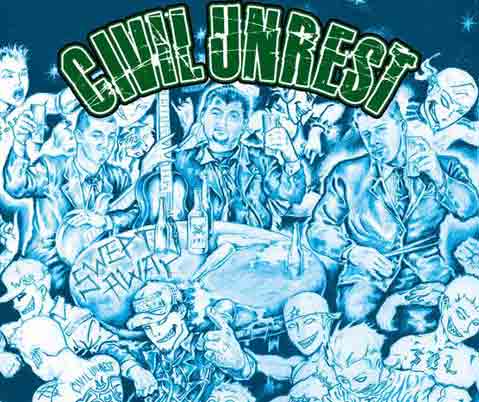S.B. Thrash Heroes Civil Unrest

Cheesy pop or hard-core thrash that’ll keep you charged up four days after a show? Kook invaders or local folks dedicated to defending their hometown? Jack Johnson or Tommy Chamberlain? Civil Unrest is a band that asks the eternal question: Which side are you on?
Anyone who is undecided-or who believes that spending 10 years here makes her or him a “local”-will have a truly unique opportunity to go out and rub elbows with real Santa Barbara and Goleta natives when Civil Unrest plays Whiskey Richard’s (435 State St.) this Saturday, June 21, at 9 p.m.
Drummer Brian LeBlanc started Civil Unrest in 2003 with former members of Black List, the punk band that dominated the Santa Barbara scene in the 1980s. Today, certified locs LeBlanc, Damian Franco (vocals), Pat Angland (guitar), and Danny Ornee (bass) see themselves as custodians of hard-core music in Santa Barbara. Influenced by Black List, RKL, Suicidal Tendencies, Exodus, and Slayer, Civil Unrest plays the kind of vein-popping stuff that encourages the physical release of pent-up frustration.
“Bars love us ’cause we pack the house and sell out the bar,” Franco explained. “But they hate us ’cause they have to pick up the hurricane-like mess after the crowd has gone.”
In Franco’s estimate, Civil Unrest crowds are “pretty much the last of S.B.’s finest,” crusty old punks who were at the shows as teenagers but who still support the scene as thirty-somethings. They are stonemasons, carpenters, landscapers, and chefs. Many double as famous surfers concerned to the utmost with alleviating crowding at their favorite breaks. A key plank in the Civil Unrest platform holds that, “All transplants and students need to split! You are not welcome and will get thrown off the jetty! Go home!”
LeBlanc acknowledges that such angry rhetoric might intimidate the average punk enthusiast. He also emphasized that this is precisely the point. But despite this blatant antagonism, Civil Unrest shows are imbued with undeniable nostalgia and camaraderie. Most fans can’t name two songs the band plays, but go to the shows simply because they know that kids they went to kindergarten with will be there. Furthermore, belying their outward hostility, the band is quick to express their gratitude to their families, the Mesa, and Goleta. One would be hard-pressed to find a more dedicated community than the Civil Unrest following.



